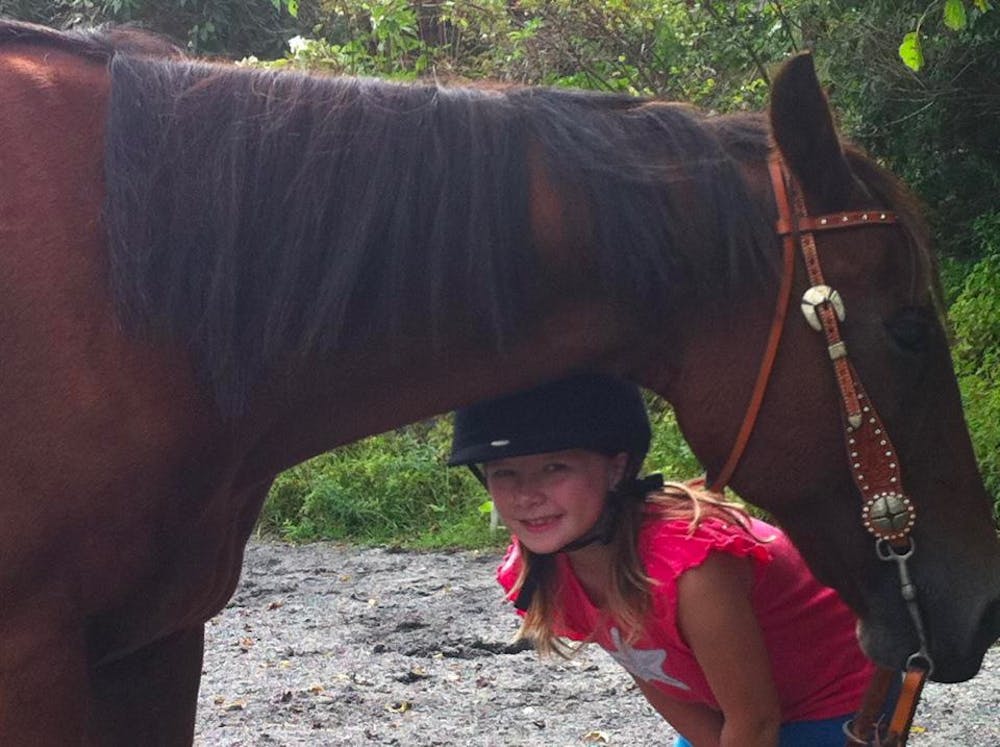
My mother’s dream since childhood was to have a horse. She was not around horses as a kid, other than in books, and only began riding in her 20s. In her 40s, she began volunteering at a horse rescue. She was interested in quite a few of the horses that passed through, like Troy, the thoroughbred who wasn’t fast enough to be a racehorse.
Still, despite encouragement from many of her friends, she never moved forward with the adoption process herself. She served on the board of the rescue, doing everything from planning fundraisers to mucking stalls to going to (largely inhumane) horse auctions to save as many horses as possible from being sent to slaughter.
On Feb. 21, 2010, my mother woke up before dawn to set out for a horse auction in New Holland, Pa. Eight-year-old me had left her a note, reading “I hope you find your dream horse today.”
When they arrived at the auction, my mother and another woman separated from the group of horse rescue volunteers. Out of nowhere, a small, bay gelding tethered to the wall turned his head as much as he could and called out to them.
My mother jokes that he knew they were the good guys, some of the few people there with an interest in preserving life rather than profiting off ending it. She and the other volunteer walked closer, and the horse just kept whinnying, or, as my mother says, “talking” — begging for help.
They returned to the group, and my mother convinced the others to bid on the remarkable horse. During the auction, a man stood on the horse in a stunt intended to show his worth. This demonstration, combined with my mother’s moving story, caused the rescue to bid on the horse. They were bidding against a well-known “kill buyer,” but in the end, the rescue outbid him.
After the auction, the horses rescued by the organization were sent to a rural area in Pennsylvania to be quarantined. The whole time, my mother thought of the bay she had seen. How incredible, she thought, that really, he had saved himself by choosing the correct people to call out to. But sometimes horses were adopted before returning to the rescue’s Long Island location. And besides, she didn’t have the experience, the time, the money... she couldn’t get a horse.
Quincy has been ours for 11 years now.
Quincy has been ours for 11 years now — and yesterday, whatever happily ever after we had stumbled into was shattered. What had been thought to be some sort of dental issue was actually an aggressive tumor. The kind of aggressive that attacks bone and flesh and connotes death soon after diagnosis.
I should have known it was serious when he was brought to an animal hospital. I should have known it was urgent when I was reminded it was the birthday of the person trailering Quincy to the hospital. I should have known my mother well enough to consider that she plays everything down.
Quincy will be put to sleep whenever the pain becomes too much for him to eat. This will likely be in a few weeks or months. One horse with this diagnosis lasted another two years, two years that I assume were filled with suffering.
How can the horse with such personality and fierceness be consumed by something so unexpected and cruel? What kind of animal saves his own life at an auction only to be taken down by something so unfair?
At a mere 14.2 hands, Quincy is just barely categorized as a horse rather than as a pony. Still, despite his stature, he is mighty, he takes up space, he is my mother’s dream come true and now he is being ripped away from us.
And I might not see him again. When she told me over the phone with certainty that he was dying, I spoke the word “no” repeatedly before switching to “I’m coming home.”
But there are still no answers. He could rapidly decline; he could last however many more months or years. I am grappling with a loss that has yet to fully set in and that I am not equipped to deal with.
My mother sobbed all day yesterday. I have been misty-eyed at points both yesterday and today, but the tears have refused to come. I do not think it will hit me until he is truly gone, in the moment that I watch him fall to the ground. I will be there, and that is a promise. The happily ever after is cut short, and yet the end may be a long one with a story of its own.
Madelyn Kye is a sophomore from Long Island, N.Y. majoring in Writing Seminars and International Studies.





